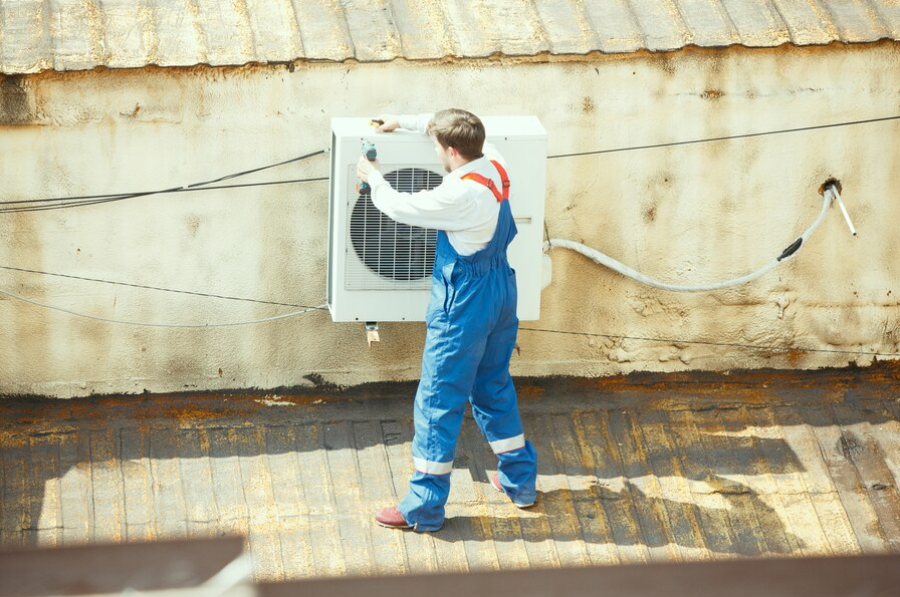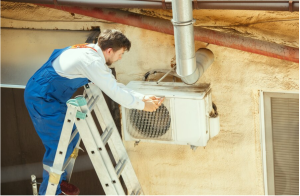acf domain was triggered too early. This is usually an indicator for some code in the plugin or theme running too early. Translations should be loaded at the init action or later. Please see Debugging in WordPress for more information. (This message was added in version 6.7.0.) in /www/wwwroot/leadcont.com/blog/wp-includes/functions.php on line 613117950 NW 53rd Street Suite 337
Miami, Florida 33166

Why Is My AC Unit Leaking? Is your AC unit leaking water? You’re not alone! A leaking air conditioner can be a real headache, especially during the summer heat. While it might seem like a minor issue, it’s actually a sign that something isn’t working properly. The most common cause of an AC unit leaking is a clogged drain line, but there are other factors at play too.
AC units can develop issues like frozen coils, dirty filters, or even low refrigerant levels—all of which can lead to water leaks. Understanding these potential causes is crucial to keeping your home cool and comfortable. In this comprehensive guide, we’ll explore the most common reasons why is my AC unit leaking and provide simple and effective solutions to fix the issue. Whether you have a window unit, central AC, or ductless system, we’ve got you covered. Let’s get your AC running smoothly again and restore comfort to your home.
Air conditioners function by cooling the air inside your home, and as a part of this process, they remove moisture from the air. This moisture is collected and drained away through the system’s drainage line. However, several factors can disrupt this process, leading to water leakage. Identifying the root cause of the leak is essential for effective repairs. Here, we break down the top reasons why is my AC unit leaking.
One of the most common causes of water leaks is a clogged condensate drain line. Your air conditioner removes moisture from the air during cooling, and this moisture is collected and funneled into a drain line. Over time, the drain line can become clogged with dust, algae, and debris. When this happens, the water has nowhere to go, and it begins to back up into the system, eventually leaking inside your home.
Turn off your ACBefore performing any maintenance, make sure to turn off your air conditioning unit to avoid electric shock or further water damage.
Locate the drain lineThe condensate drain line is usually a small PVC pipe located near the evaporator coil inside the unit. You can trace it from the inside of the air handler to the outside of your home.
Clear the clogTo clear the line, you can use a wet-dry vacuum. Attach the vacuum hose to the outside end of the drain pipe and run it to suck out any debris. Alternatively, you can use a plumbing snake or a plumber’s coil to dislodge the clog.
Flush the lineOnce the clog is removed, flush the line with water to ensure it’s completely clear. You can also use a solution of water and vinegar to help break down algae buildup. If the problem persists, a professional plumber may need to inspect the line.

Frozen evaporator coils are another common cause of water leaks. When the coils freeze, they can no longer absorb heat effectively. As the ice thaws, the resulting water drips onto the floor or surrounding components. Several factors can cause the coils to freeze, including poor airflow, low refrigerant levels, or dirty filters.
To prevent further freezing and water damage, immediately turn off the AC unit.
VLet the coils thawAllow the coils to thaw naturally. This can take several hours. If you are in a hurry, you can place a fan near the coils to speed up the process.
Inspect the air filterA clogged air filter can reduce airflow to the evaporator coils, causing them to freeze. Check the air filter and replace it if necessary. Ideally, replace your air filters every 1 to 3 months to avoid similar problems in the future.
Check the refrigerant levelLow refrigerant can cause the coils to freeze. You’ll need a professional technician to check and refill the refrigerant, as handling refrigerant requires specialized knowledge and equipment.
Ensure proper airflowMake sure that the airflow to the coils is unrestricted. Check for blockages in vents, ducts, or the return air grill, and remove any obstacles. If the evaporator fan is malfunctioning, it will need repair or replacement.
Refrigerant plays a vital role in the cooling process of your air conditioner. Low refrigerant levels can cause a variety of issues, including frozen coils and reduced cooling performance. When refrigerant levels are low, the system may also run longer to try to achieve the desired temperature, leading to increased energy bills and potential water leaks when the coils freeze.
Identify signs of low refrigerantIf your air conditioner is cooling inefficiently or the coils are freezing, you might have low refrigerant levels. You may also notice that your AC unit is running longer than usual without effectively cooling the space.
Contact a professionalIf you suspect a refrigerant leak, it’s best to contact a licensed HVAC technician. Handling refrigerant requires professional training, as it’s harmful and potentially hazardous if not managed properly.
Fix the leakThe technician will inspect the system for leaks and fix any problems. Once the leak is repaired, the refrigerant will be recharged to the correct level.
Prevent future leaksRegular maintenance checks can help prevent refrigerant leaks. Keeping your system well-maintained will ensure that the refrigerant stays at optimal levels.
Air conditioners that use a condensate pump to push the collected moisture outside can experience leaks if the pump becomes damaged or malfunctions. This is especially common in systems that are located in basements, where gravity cannot help with water drainage.
Turn off the powerAlways begin by turning off the power to the air conditioner to avoid any electrical issues.
Inspect the pumpLook for visible cracks, leaks, or other signs of wear and tear on the condensate pump. If you notice any damage, it will need to be replaced.
Replace the pumpTo replace the pump, disconnect the faulty pump from the system and install the new one. Ensure the replacement pump matches the specifications of the original pump.
Test the pumpOnce the pump is installed, test it by turning the air conditioner back on and monitoring the drainage. If everything works correctly, the water should be pumped out of the system without any leaks.
A dirty air filter can restrict airflow, leading to a variety of problems, including frozen evaporator coils, poor cooling performance, and water leaks. Air filters trap dust, dirt, and debris, preventing them from entering the system. However, when the filter becomes clogged, it reduces airflow to the evaporator coils, which can cause freezing and leaking.
Turn off the air conditionerBefore replacing the filter, make sure to turn off the air conditioner to prevent dirt and dust from entering the system.
Remove the old filterLocate the air filter and remove it from the system. Most air filters slide in and out of a designated slot in the air handler or return air grille.
Clean or replace the filterIf the filter is washable, clean it thoroughly with water and soap, then allow it to dry before reinstalling it. If the filter is disposable, replace it with a new one.
Regular filter maintenanceTo prevent future issues, replace or clean your air filters every 1 to 3 months, depending on the type of filter and your usage.
Leaky ducts can cause excess moisture to build up in your system, leading to water leaks. Leaks in the ducts can allow warm air to mix with cool air, creating condensation. This condensation can accumulate, leading to moisture buildup and potential leaks. Additionally, air loss from the ducts can reduce your AC’s efficiency, forcing it to run longer and harder.
Inspect the ductsCheck the ductwork for any visible cracks, holes, or gaps. Inspect areas around joints, seams, and connections where leaks are likely to occur.
Seal the leaksUse duct tape, mastic sealant, or foil tape to seal small leaks in the ductwork. For larger holes, you may need to use a stronger sealant or replace the damaged section of the duct.
Insulate the ductsProper insulation can help reduce condensation. Make sure the ducts are well-insulated, particularly in areas like attics or basements, where temperature fluctuations are common.
Professional inspectionIf the ducts are severely damaged, or if sealing the leaks doesn’t resolve the issue, consider hiring a professional to inspect and repair the system.
If your air conditioning system lacks sufficient insulation, it can result in condensation that leads to leaks. Insulation helps to maintain the temperature of the refrigerant lines and prevents moisture buildup. Without proper insulation, your system may experience more condensation, which can leak out of the unit.
Inspect the insulationCheck the insulation around the evaporator coils, refrigerant lines, and ducts. Look for gaps, rips, or areas where the insulation is missing.
Replace or add insulationReplace any damaged insulation with high-quality foam or fiberglass insulation. Ensure that all lines and ducts are properly insulated to prevent condensation from forming.
Prevent future issuesRegularly check your system for insulation issues and replace any damaged areas promptly to prevent leaks and improve the efficiency of your AC.
Improper installation of an air conditioning system can lead to leaks. Poor installation may cause incorrect refrigerant levels, poor airflow, or improper drainage, all of which can contribute to water leaks. If your system wasn’t installed correctly, it may not function as efficiently as it should, and it may develop leaks over time.
Contact a professional technicianIf you suspect that the installation is the root cause of your leaks, it’s best to consult a licensed HVAC technician. They can assess the installation and make any necessary adjustments.
Correct the issuesThe technician may need to realign the condensate drain, check refrigerant levels, adjust airflow, or even reinstall parts of the system to ensure proper operation.
Schedule routine maintenanceOnce your system is properly installed, make sure to schedule regular maintenance checks to prevent future issues and ensure optimal performance.
To avoid these issues in the future, here are some proactive maintenance steps:
| Task | Frequency | Benefits |
| Change Air Filters | Every 1-3 months | Improves airflow and reduces strain on the system |
| Clean the Drain Line | Annually | Prevents clogs and promotes proper drainage |
| Check Refrigerant Levels | Annually or as needed | Prevents freezing of coils and maintains efficiency |
| Inspect Ductwork | Every 1-2 years | Prevents moisture buildup and increases system efficiency |
By following these maintenance practices, you can significantly reduce the chances of why is my AC unit leaking and extend the lifespan of your unit.
AC leaks can be frustrating, but most causes can be easily identified and fixed with a little effort. Regular maintenance, proper installation, and attention to common issues such as clogged drain lines, frozen coils, and low refrigerant can keep your system running smoothly.
If you’re experiencing AC leaks and aren’t sure how to proceed, it’s always a good idea to consult a professional HVAC technician. At LeadCont, we’re here to help. Our team can quickly identify the problem and offer effective solutions to keep your system functioning at its best.
Staying on top of your AC’s maintenance is the key to avoiding unnecessary repairs, improving efficiency, and ensuring your home stays comfortable all year round. Register for a free quote and let us take care of your AC needs!
Ever find yourself staring at your computer screen a good consulting slogan to come to mind? Oftentimes.
